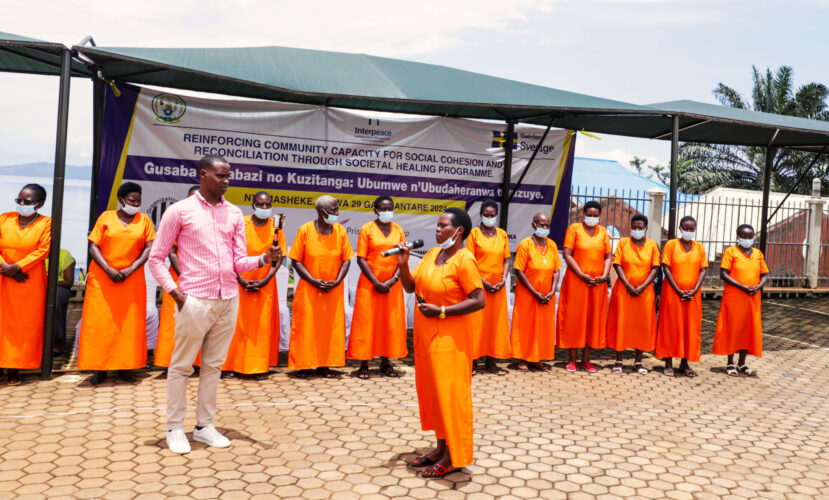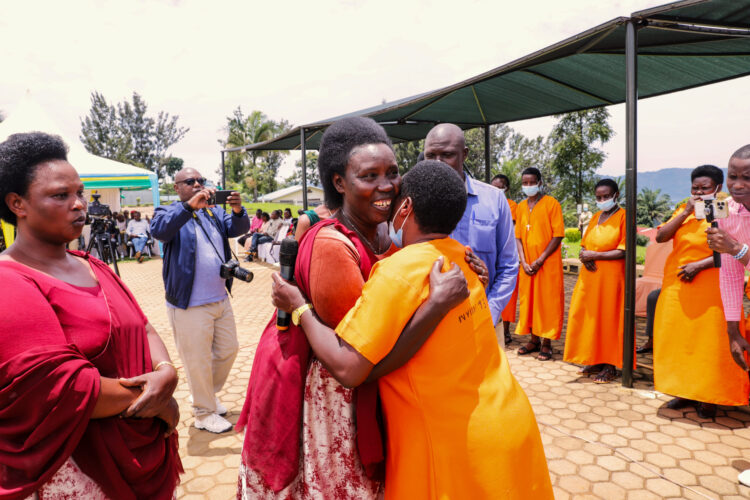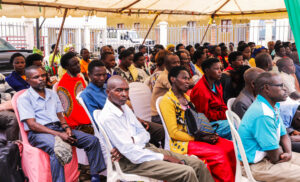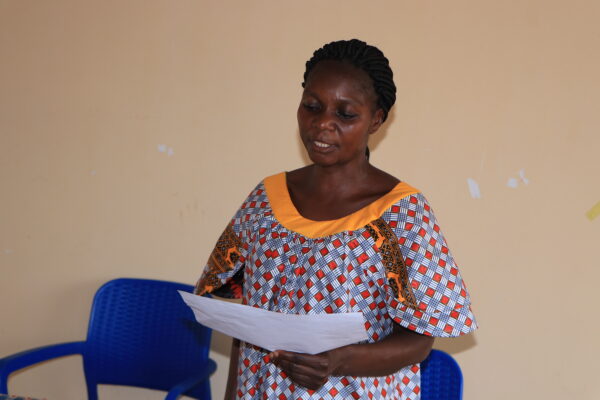Linking genocide prisoners with their victims’ families to foster reconciliation and resilience in Rwanda
Linking prisoners with those they offended – before their release - especially those who committed heinous crimes, like genocide or murder, should be an integral part of the prisoner rehabilitation and reintegration process. This facilitates a smoother and more effective reentry of prisoners into their families and community.
This step is relevant and a necessity in Rwanda, as approximately 20,000 prisoners convicted of genocide crimes perpetrated during the 1994 Genocide against the Tutsi, including masterminds, are expected to be released in the coming years. In addition, many genocide convicts have already been released, integrated into their communities, and live alongside Genocide survivors.
In March 2024, Interpeace, together with its local partners Dignity in Detention and the Rwanda Correctional Service (RCS), organised a unique event to reconnect 19 female prisoners detained in Nyamagabe Prison, Southern Province of Rwanda, with families of their victims and the broader community to seek forgiveness. The event took place in Nyamasheke District, Western Province, where they committed their crimes.
“I am standing before you today to ask for forgiveness for crimes I committed during the Genocide against the Tutsi in 1994. I killed my neighbours and friends. I acknowledge my crimes and humble myself before all of you, especially Genocide survivors,” implored Martha Mukamushinzimana, a 55 years old mother of five.

Mukamushinzimana participated in the killing of the Tutsi who sought refuge in the Nyamasheke Catholic Parish located in her neighbourhood and, in 2009, was sentenced to 15 years in jail by a Gacaca Traditional Court. Yet, her children didn’t know the reason for her imprisonment. “I have been a worse mother. I take this opportunity to apologise to my children. I behaved like a coward and felt ashamed to tell them the truth about my crimes,” said Mukamushinzimana who will be released in one month. She added, “I have been transformed; I am a new person now. I feel ready to come back and live in harmony with you and build our country together”.
One by one, the 19 women prisoners came forward to recount their crimes in front of genocide survivors, their own family members, local authorities, and other community members who came to witness. Their crimes ranged from killing the Tutsis, bringing stones used to kill, and luring victims to their homes under the guise of protection only to kill them. They took accountability for their actions and humbled themselves before community members.
Reconnecting prisoners with those they offended is part of Interpeace’s approach to psychological prisoner rehabilitation and reintegration, implemented in line with its Societal Healing programme in Rwanda. This programme fosters social cohesion and reconciliation and promotes psychological and economic resilience. Priority is given to those nearing release.
As Interpeace’s research studies have shown, during their incarceration, prisoners experience mental health distress resulting from the atrocities they committed and their life in prison, which constitute a stumbling block to their effective rehabilitation. The Societal Healing Programme established Sociotherapy healing spaces in prisons to provide inmates with psychosocial support care in a group setting. For three and a half months, weekly Sociotherapy sessions equip them with life skills to cope with their mental problems and take a new life orientation.
During the healing process, many voluntarily express their willingness to be reconciled with their victims’ families and the community. This is facilitated through reconciliation events, like the one in Nyamasheke, which was organised after thorough preparation of the concerned community members. Sociotherapy healing spaces play a catalytic role in shifting prisoners’ mindsets to become repentant individuals who accept responsibility for their acts and feel ready to live with others in society.
“Before attending a Sociotherpay healing space, I had no willingness to confess my crimes. I was convinced that I was innocent and falsely imprisoned. Sociotherapy enabled me to reflect on myself and my misdeeds. I realised I had killed my friends and neighbours and hurt their families and my community. From the bottom of my heart, I humbly ask Genocide Survivors for forgiveness,” confessed Agatha Nyirahabimana, 70 years old.

The families of the victims accepted their apologies without resentment. Saverina Utetiwabo, a Genocide survivor, forgave Mukamushinzimana. They had been close friends since childhood and were members of the Association des Eglises de Pentecote au Rwanda (ADEPR) church choir. However, Utetiwabo didn’t know her friend was a “genocidaire” who participated in the killing of her family members. “Learning about it was a total shock for me, and I immediately cut ties with her because I didn’t want to live with a criminal. Now that she has publicly confessed, I forgive her. I feel relieved and ready to renew our relationship,” she said.
Rwanda’s societal fabric is still fragile following the tremendous consequences of the genocide. Unprepared released prisoners are likely to cause tensions, trauma, and anxiety among families of genocide survivors and the community, posing a serious threat to reconciliation and resilience gains achieved. Providing prisoners nearing release with psychosocial support, coupled with community preparation, helps address these challenges and lays a solid foundation for a more reconciled, peaceful, and resilient society.
“In the past, we used to see genocide prisoners being released without our knowledge, and that caused fear and anxiety. We would call in panic authorities or security organs to alert them, as we thought released ‘genocidaire’ could kill us too. I am happy they came here to interact with us before their release,” said Utetiwamo.
Speaking at the event, the Executive Secretary of Western Province and the representative of Ibuka, an umbrella organisation of genocide survivors’ associations, commended the process's importance in truth-telling and fostering reconciliation and resilience.



